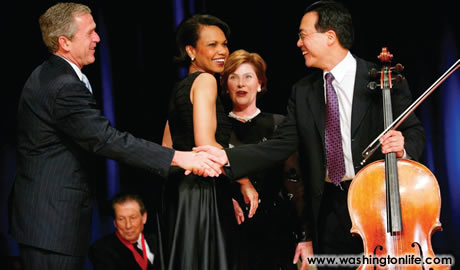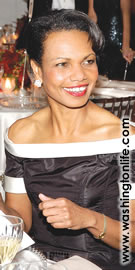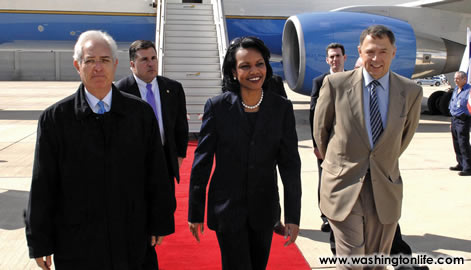|
CONDI'S OPUS
Power, concertos and the spirit of Old Europe
BY ROLAND FLAMINI
Condoleezza Rice opened her eyes at her usual wake-up time of 4.30 a.m. to find Ludwig van Beethoven sitting on the end of her bed. It was the Beethoven familiar from the middle age portraits, hair disheveled, clothes well-worn and crumpled. He was quietly humming the Ode to Joy.
When one has confronted Dick Cheney and Don Rumsfeld across the table in the White House situation room, a visit from the ghost of a dead composer brings no fear. "Beethoven - Ludwig - what are you doing here?" Condi asked.
"They tell me you are a gifted musician," Beethoven said, stopping the humming. "A pianist, yes," Condi replied, sitting up, "and a good one. And Ludwig, I love playing your music, it's -"
"Ja, ja. Of course you do, my dear. But they also tell me you are a politician," the composer went on.
"Well, I am the Secretary of State of the United States."
Beethoven frowned at her across the covers. "You are blessed with the talent, and you have the training to be a pianist, to bring joy to people with your playing, and you choose to be a secretary?"
"No, no, you don't understand," Condi said smiling. "I direct the international affairs of the world's leading superpower. I am one of the chief ministers to the President of the United States of America, the most powerful man on earth. I'm like ... like Metternich."
When one has confronted Dick Cheney and Don Rumsfeld across the table in the White House situation room, a visit from the ghost of a dead composer brings no fear. "Beethoven - Ludwig - what are you doing here?" Condi asked.
Beethoven wrinkled his nose. "Ach! I sincerely hope not. That charlatan." Then he brightened. "America! How we admired you!
That declaration of independence, so bold, so direct! I had meant to dedicate a symphony to America, my tenth, you know. But somehow, I never got round to finishing it."
Condi said: "The truth is, when I was at college I was a piano major, and about half way through the course, I realized that I was pretty good but not good enough to be a great musician. So I took a course in international politics, and it was a course about the Soviet Union, sorry, the Russian empire.
There were some that thought that there was no reason for an African- American from Alabama to be interested in the Soviet Union, but I just loved it. So you see, although I'm an accomplished piano dabbler, the piano is not my life's work. My life's work is to advance my country's mission to bring democracy to the world. But, yes, I would have liked to have sat at a piano in a concert hall and performed - well, your wonderful C minor variations, for example."
Beethoven shook his head dismissively. "Ach, those variations, so trivial, I didn't even assign them an opus number .... Listen to me: music is a higher revelation than all wisdom and philosophy, and certainly all politics," Ludwig declared, pausing to savor his bon mot. "Music is the mediator between the spiritual and the sensual life."
"Music is important to me," Condi replied earnestly. "It releases the tension after a difficult day. In my previous job, when certain ... supposed colleagues would shut me out of important decisions, I kept my cool, but when I came home, I took out my frustrations on the piano. I would lose myself in one of your sonatas. The piano tuner was there every other week. In my early days as secretary, when I had to bring a wayward and rebellious branch of the government into line with the thinking of the administration, I had some tough days, let me tell you - playing the piano helped."
"Sometimes art follows life," the composer intoned, "sometimes art helps life, filling the emptiness, calming the emotions, soothing the frustrations."
"My piano playing is occasionally a diplomatic device," Condi went on, warming to the subject. "When I agree to play at a Washington embassy, it's a sign that the United States considers them friends. But when I refuse, they had better take a good look at the state of their bi-lateral relations. In July, I even played in Asia. I was at a summit of Asian countries. Traditionally, the foreign ministers close the conference by giving a show, a silly skit of some type. But you probably won't see me performing in some of the embassies of Old Europe."
Beethoven gave another of his sniffs: "Con dolcezza? Not a musical term I'm aware of. I know dolce, and con espressione, and I think I was the fi rst to use sforzando. But not con dolcezza."
"I'm guessing you're not the silly skit type," replied Beethoven.
"It was not a time to be frivolous, so I played something that reflected my serious mood. I like to remind Europeans that culture is not their exclusive property. I can get irritated when the Europeans act superior. I once snapped at a French interviewer who was putting on airs, 'I speak French, I play Bach, I can stand toe-to-toe with you in your culture,' I told him. Incidentally, I also play the flute, and I'm an expert ice skater."
"That must be useful when you find yourself on thin ice," Beethoven said, laughing heartily at his own joke. "You are an accomplished woman, but America is the New World and a young country. Who was it who said, 'Almost everything that sets us above savages has come to us from the Mediterranean?' Some Englishman, I believe."
"Ludwig, you have been away a long time. The past is the past. Power has shifted away from the old centers. The United States is the world model for freedom now, for democracy. The United States is the moral force that liberates others from tyrannical leaders and oppressive regimes."
Beethoven gave a long, eloquent sniff. "That's what Napoleon said. I dedicated a symphony to him - the Eroica - because I thought he would sustain the democratic and republican ideals of the French Revolution. He turned out to be nothing but an ambitious despot - greedy for power and determined to conquer the world with his soldiers tramping across the globe in the name of liberty, equality and fraternity. The hope for a new world order turned out to be its curse. I removed the dedication, of course. And when Wellington beat him at Waterloo, I celebrated his victory in music. I hope your king doesn't have Napoleonic ambitions."
"King? We have a president. He's a visionary; his mission is to leave the world a better place than he found it. Under his direction, we are transforming the political landscape in the Arab world, and we are bringing democracy to the world of muezzins and desert."
 |
| First lady Laura Bush looks on as President Bush shakes hands with cellist Yo-Yo Ma after his performance with, then, U.S. National Security Adviser Condoleezza Rice at the National Endowment for the Arts National Medal of Arts Awards ceremony at Constitution Hall in 2002. (AP Photo/Pablo Martinez Monsivais) |
"Peacefully, one hopes, so that alle menschen warden bruder," Beethoven said, quoting from the Ode to Joy, "all people become brothers." Condi hedged: "Well, some menschen need more persuading than others," she replied. "You are at war?"
"Our cause is just, and, as the President says, we must stick to our purpose. I know this man. He is honest and moral. I served his father before him, who was another great leader."
Beethoven's considerable eyebrows rose in surprise: "His father was also the president? A dynastic presidency?"
"No, each was elected in turn." "And you served them both? Ach du lieber, Condi, you're no novice in the affairs of state. You are a Metternich - without the bit about the charlatan, naturally. Or perhaps that Frenchman, what was his name?"
"Talleyrand?" Condi quickly retorted. "Talleyrand - or perhaps Clausewitz. Why not Clausewitz? Didn't he say 'war was merely the continuation of diplomacy by other means?'" Condi answered: "Talleyrand advised, 'pas trop de zele' - not too much zeal. I, on the other hand, am extremely zealous in the interest of my country and my president. Besides, Talleyrand was a liar and took bribes from everybody."
"Come, come liebe Condi. Isn't a diplomat paid to lie in the interest of his - or her - country? And a senior diplomat paid to tell senior lies in the interest of his - or her -country?"
"Nonsense," Condi snapped. "As I've said many times, there cannot be an absence of moral content in American foreign policy. Europeans giggle at this. They say we are naïve, but we are not European, we are American, and we have different principles."
"I see. Condoleezza? Where on earth did you get that name? Some traditional American name, is it?"
"My mother loved music, and she wanted to name me after the musical term con dolcezza, but somehow it got changed to Condoleezza, and that's how I was christened."
Beethoven gave another of his sniffs: "Con dolcezza? Not a musical term I'm aware of. I know dolce, and con espressione, and I think I was the first to use sforzando. But not con dolcezza People had started using too many score markings by the time I made my exit. Leaves very little scope for personal interpretation by the performer, I think."
"Ludwig .... What are you doing here?" "I've heard you play - I'm no longer deaf on the other side, you know ... although sometimes I hear others playing my music, and I wish I were still deaf. So, I heard you play, and I thought you showed promise - if you practiced. I was curious to learn why you had set aside music for politics. Now I realize - you are a courtier. You are ambitious, and you are able. Behind that calm façade are a driving determination and a strong will. You are a swan, Condi. Sleek and smooth on the surface but pedaling furiously beneath it to reach your desired goal. Do you at least ever play the piano for your President?"
"He is not partial to dead composers, which I'm afraid is how you are often known here."
"Oh well, only the pure of heart can make good soup," Beethoven remarked.
"Ludwig, now it's my turn to ask you - what on earth does that mean?"
"Who knows, apparently I said it once when I was alive," Beethoven replied, melting through Condi's bedroom wall.
 |
| Also known for her taste in designer clothes, Condoleezza takes to the red carpet at the 27th Annual Kennedy Center Honors Gala iin 2004. Photo by Evan Agostini/Getty Images |
THE RISE ... AND RISE ... OF CONDI
At the historic 1989 summit in Malta between the elder George Bush and Mikhail Gorbachev, in the middle of a Mediterranean winter storm, Bush introduced the Soviet leader to a slim, young woman saying, "This is Condi Rice, she tells me everything I know about the Soviet Union."
Knowing everything - or at any rate, a great deal - as a specialist on the Soviet Union and eastern Europe has been Condoleezza Rice's passport to power and influence as the trusted adviser to two presidents. Under the wing of her mentor, General Brent Scowcroft, Bush Sr.'s national security adviser, she was present at the creation of a free and democratic eastern Europe following the collapse of the Soviet Union in the late 1980s.
In a way, she was Bush Sr.'s gift to his son George. The former president brought the two of them together to discuss foreign policy when the latter was considering running for president. The current president has never been heard to say that Condi tells him everything he knows about foreign policy, but it's certainly the case.
Flying solo as the White House national security adviser in the first Bush administration, Condoleezza Rice had to do some learning herself to expand her horizons from Russia to the entire globe. But being extraordinarily gifted, she was soon on top of her brief. Having the confidence and protection of the president she was able to stand up to what former British ambassador to Washington Christopher Meyer calls "the Big Beasts" of the Bush cabinet: Cheney, Rumsfeld, and Powell. Her self-control is phenomenal, and her occasional flare-ups are quickly brought under control.
As security adviser she knew both her strength and her place, and she used both to repair the damage done by the rivalry between Defense and State. When Bush was re-elected she was the obvious choice to step into the post of secretary of state - the country's 66th. She was the first African-American woman to hold the office, but not the first woman - Madeleine Albright holds that distinction. There is another link between the two women - Madeleine Albright's father, Joseph Korbel, was Rice's political science professor at the University of Denver.
Rice, now 52, was born in Birmingham, Alabama, to middle class professional parents. Her father was a Presbyterian minister and her mother a high school music teacher. As a small girl she moved with her parents from Birmingham to Denver, Colorado. Her parents, she has been quoted as saying, gave her the kind of education that would enable her "to confront white society on its own terms." Initially, she wanted to be a concert pianist, but the realization that she didn't quite have the edge to become a front-rank performer, and an almost simultaneous fascination with international affairs, changed the course of her life.
She earned her PhD at 26, and shortly afterwards was appointed to the faculty of Stanford University. As a board member of the Chevron Corporation, she had an oil tanker named after her.
Unlike most African-Americans she found her political home in the Republican Party. There is no better example of her personal clout than the fact that when she headed the White House National Security Council, State Department staffers would complain that her department called the shots. Now that she is at State, with her former deputy Stephen Hadley holding down her old post, the situation is reversed: it's State that dictates the foreign policy moves to the White House.
 |
| Secretary Rice at Ben Gurion Airport Tel Aviv with U.S. Ambassador to Israel, Richard H. Jones , right. March 2007. Photo: Matty Stern/U.S. Embassy Tel Aviv. |
| 
